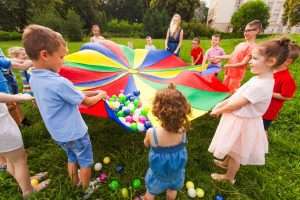Play is a fundamental part of early childhood education and development.
It is through play that children explore the world around them, develop essential skills, and build social relationships.
As a nursery manager, you play a crucial role in weaving play-based learning into your curriculum, ensuring the children under your care receive a well-rounded and engaging educational experience.
In this blog, we’ll explore the role of play in early childhood education and how you can effectively integrate play-based learning into your nursery curriculum.
The Role of Play in Early Childhood Education
Cognitive Development
Play is instrumental in boosting cognitive development in young children. Through play, the children in your care will develop critical thinking and problem-solving skills.
Activities like building with blocks, working on puzzles, and engaging in role-playing scenarios encourage them to think creatively and come up with solutions to the challenges they face.
These activities also help improve memory and concentration, fostering a love for learning. When kids play, they’re not just having fun – they’re learning how to navigate the world and understand complex concepts.
Social and Emotional Development
Play provides a natural context for children to learn social skills and build emotional resilience.
When kids play together, they learn to take turns, share, negotiate, and resolve conflicts. These interactions help them understand and manage their emotions, fostering empathy and cooperation.
Playtime becomes a mini-training ground for life’s social situations.
Physical Development
Physical play is essential for developing motor skills and overall physical health.
Activities like running, climbing, and dancing help kids improve their coordination, strength, and balance. Play also encourages healthy habits and active lifestyles from an early age.
So, whether it’s a game of tag or a dance-off, these activities contribute significantly to a child’s physical development.
Language Development
Engaging in play activities enhances language development. Through imaginative play and storytelling, kids expand their vocabulary, improve their communication skills, and learn the nuances of language.
Conversations during play help them understand sentence structures and grammatical rules. When children engage in dialogue, whether real or imagined, they’re building a foundation for effective communication.
Incorporating Play-Based Learning into the Nursery Curriculum
Designing a Play-Rich Environment
To effectively incorporate play-based learning into your nursery curriculum, create a play-rich environment.
Set up various play areas with age-appropriate toys, books, and materials. The environment should be inviting and stimulating, encouraging children to explore and engage in different types of play.
A well-designed play area can make all the difference in sparking kids’ curiosity and imagination.
Integrating Play with Learning Objectives
While play should be spontaneous and enjoyable, it can also be aligned with specific learning objectives.
You can design activities that integrate play with educational goals. For example, a counting game can help with numeracy skills, while a storytelling session can enhance language development.
By cleverly merging play with learning objectives, you ensure that playtime is both fun and educational.
Providing a Balance of Structured and Unstructured Play
A balanced approach to play-based learning involves offering both structured and unstructured play opportunities.
Structured play activities, guided by educators, can target specific skills and concepts.
Unstructured play, on the other hand, allows kids to use their imagination and creativity, making choices about how they want to play. This balance helps cater to different learning styles and needs.
Training Staff in Play-Based Learning
Your staff play a pivotal role in facilitating play-based learning. Providing training and professional development opportunities can help them understand the importance of play and how to effectively incorporate it into the curriculum.
Training can include workshops on play-based learning techniques, child development, and creating inclusive play environments.
When your team is well-prepared, the quality of play-based learning improves significantly.
Encouraging Parental Involvement
Parental involvement is crucial in reinforcing the benefits of play-based learning at home.
Engage parents by organising workshops and providing resources on the importance of play in early childhood education.
Encouraging parents to participate in play activities at home strengthens the home-nursery connection and supports children’s development.
When parents understand the value of play, they can better support their child’s growth outside the nursery setting.
Conclusion
Play is an integral component of early childhood education, contributing significantly to cognitive, social, emotional, physical, and language development.
As a nursery manager, you have the responsibility and opportunity to integrate play-based learning into your nursery curriculum, creating a nurturing and stimulating environment for children.
By designing play-rich environments, aligning play with learning objectives, balancing structured and unstructured play, training staff, and involving parents, you can ensure that play remains a vital part of early childhood education.
Remember, play in early childhood education isn’t just about fun. It’s about laying the foundation for lifelong learning and development.
For more information on how you can use Nursery Story to enhance your children’s experience, visit nurserystory.co.uk.




